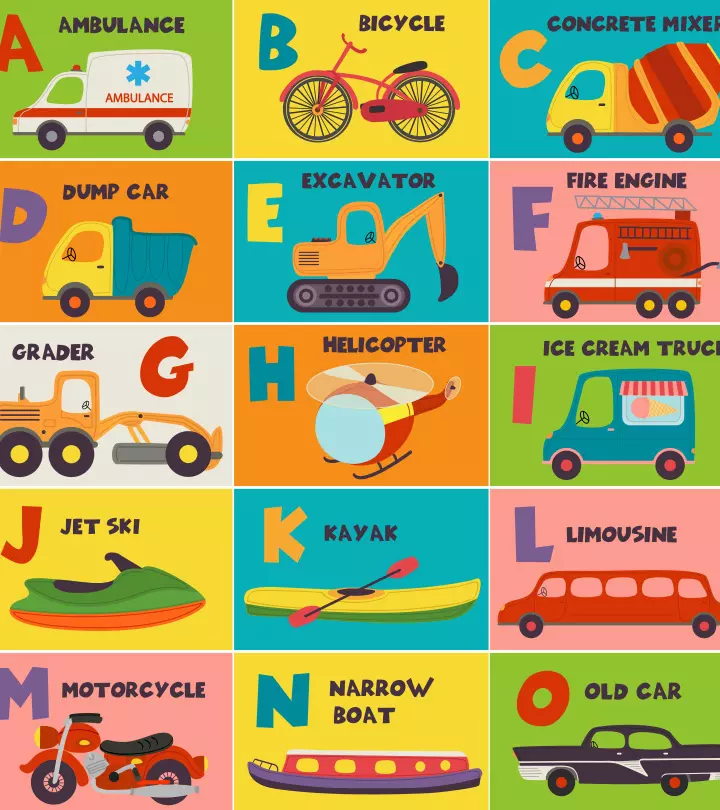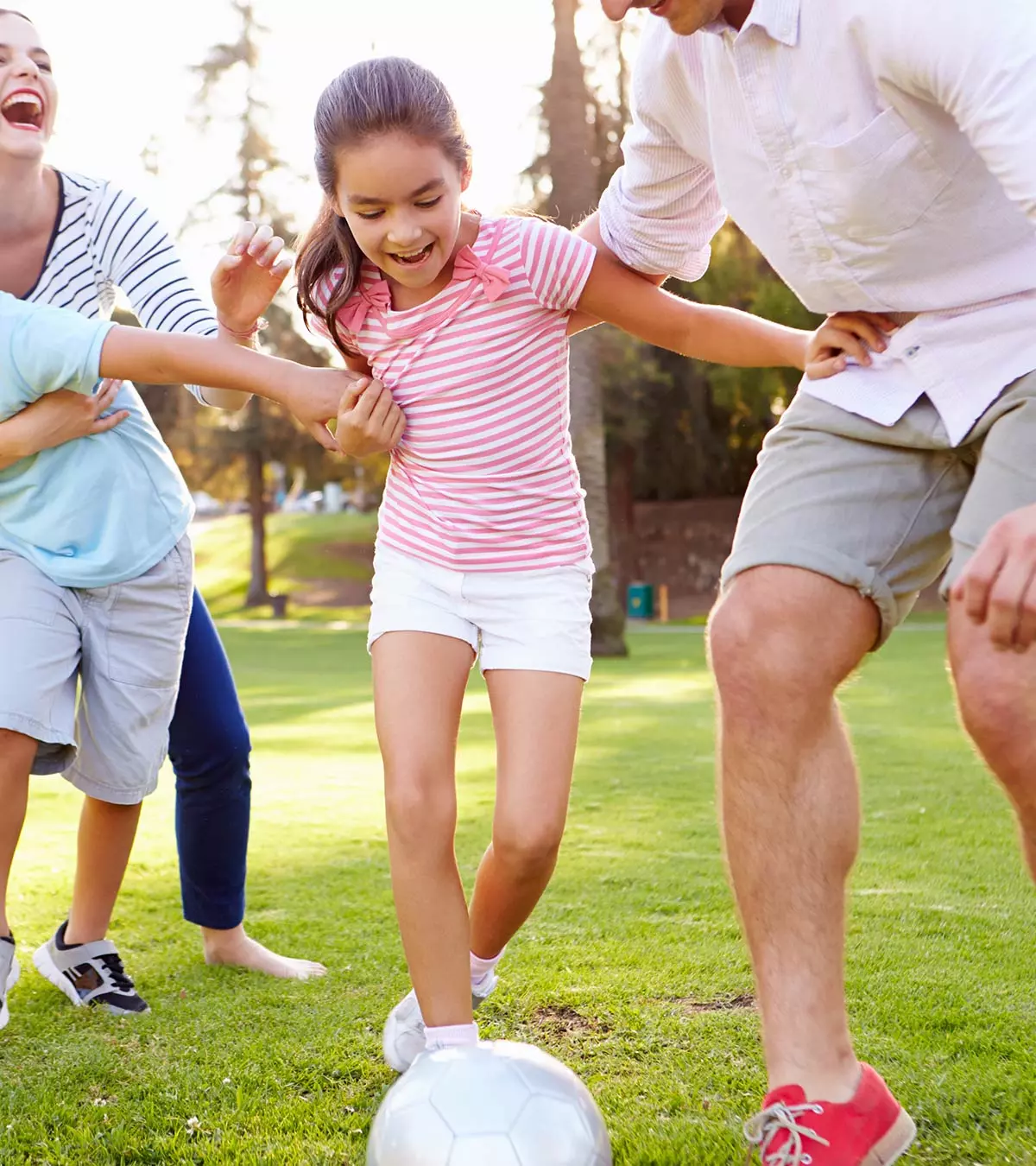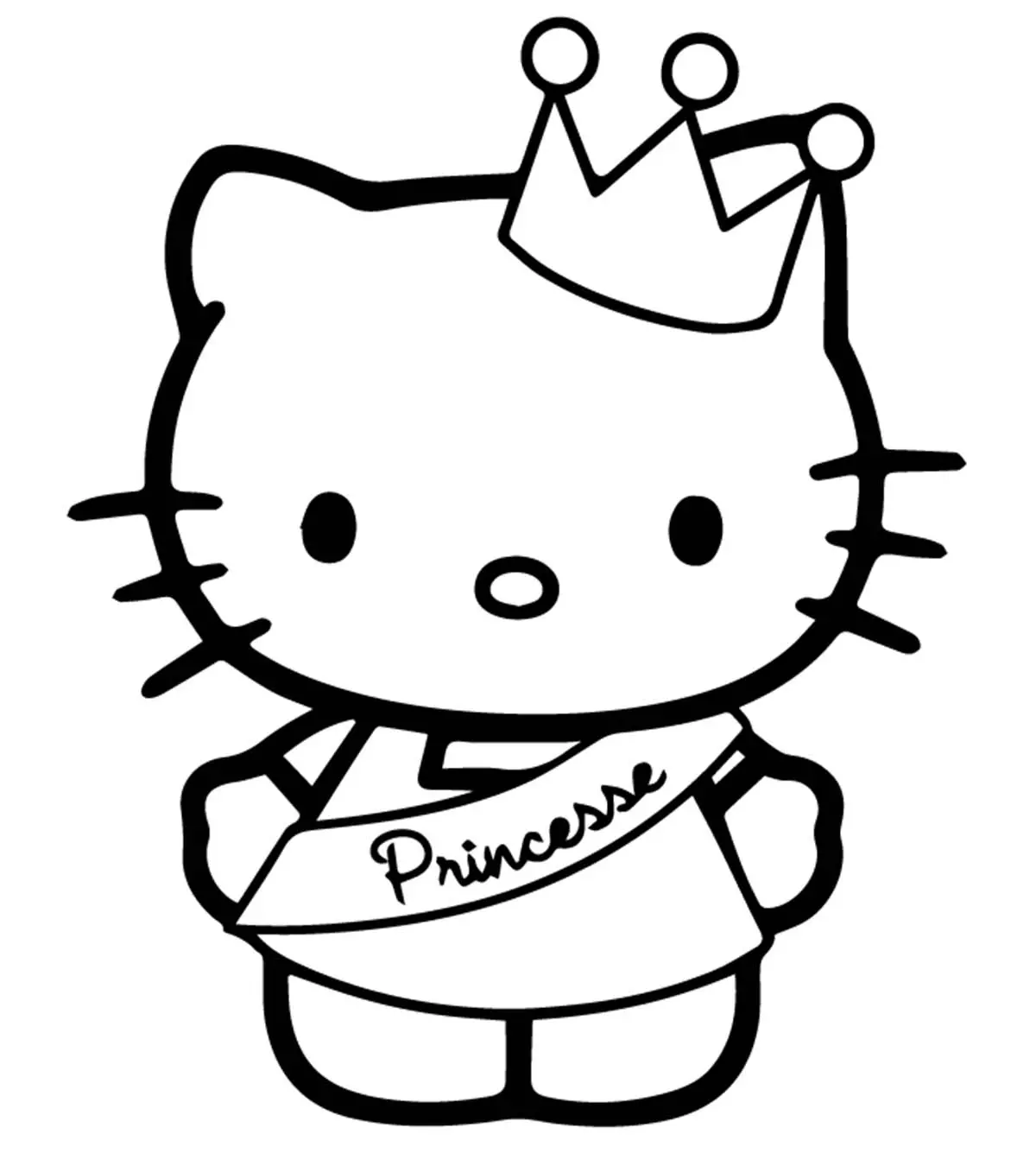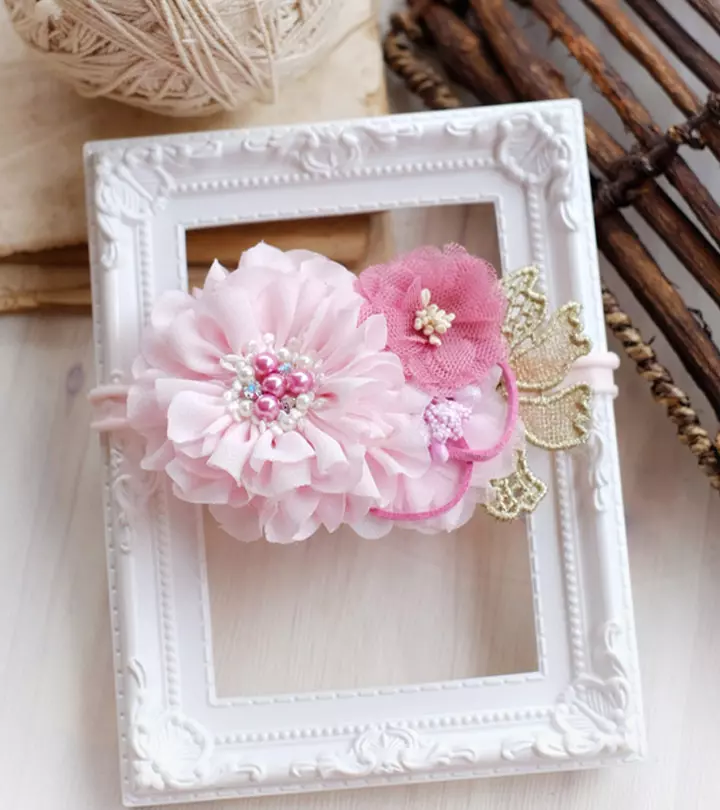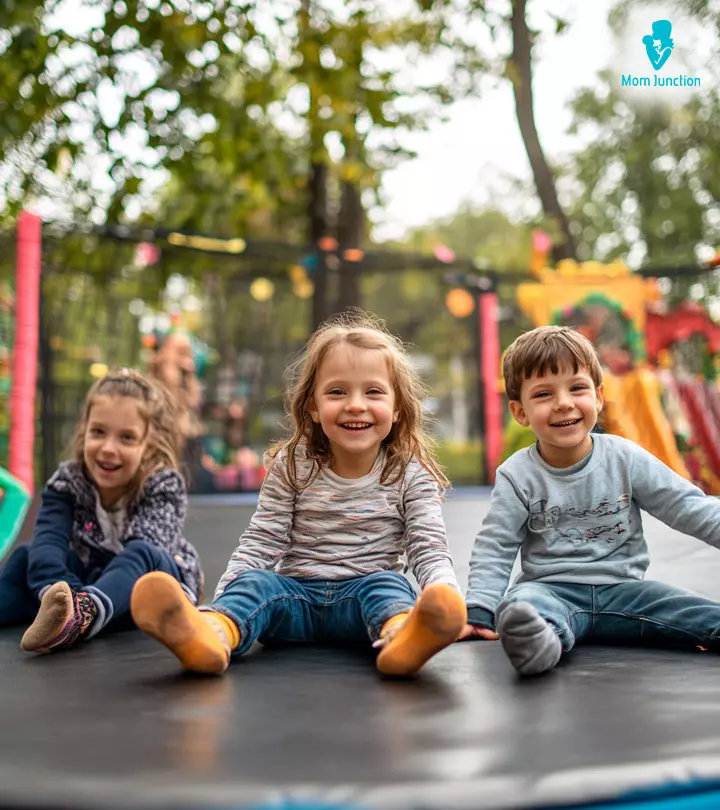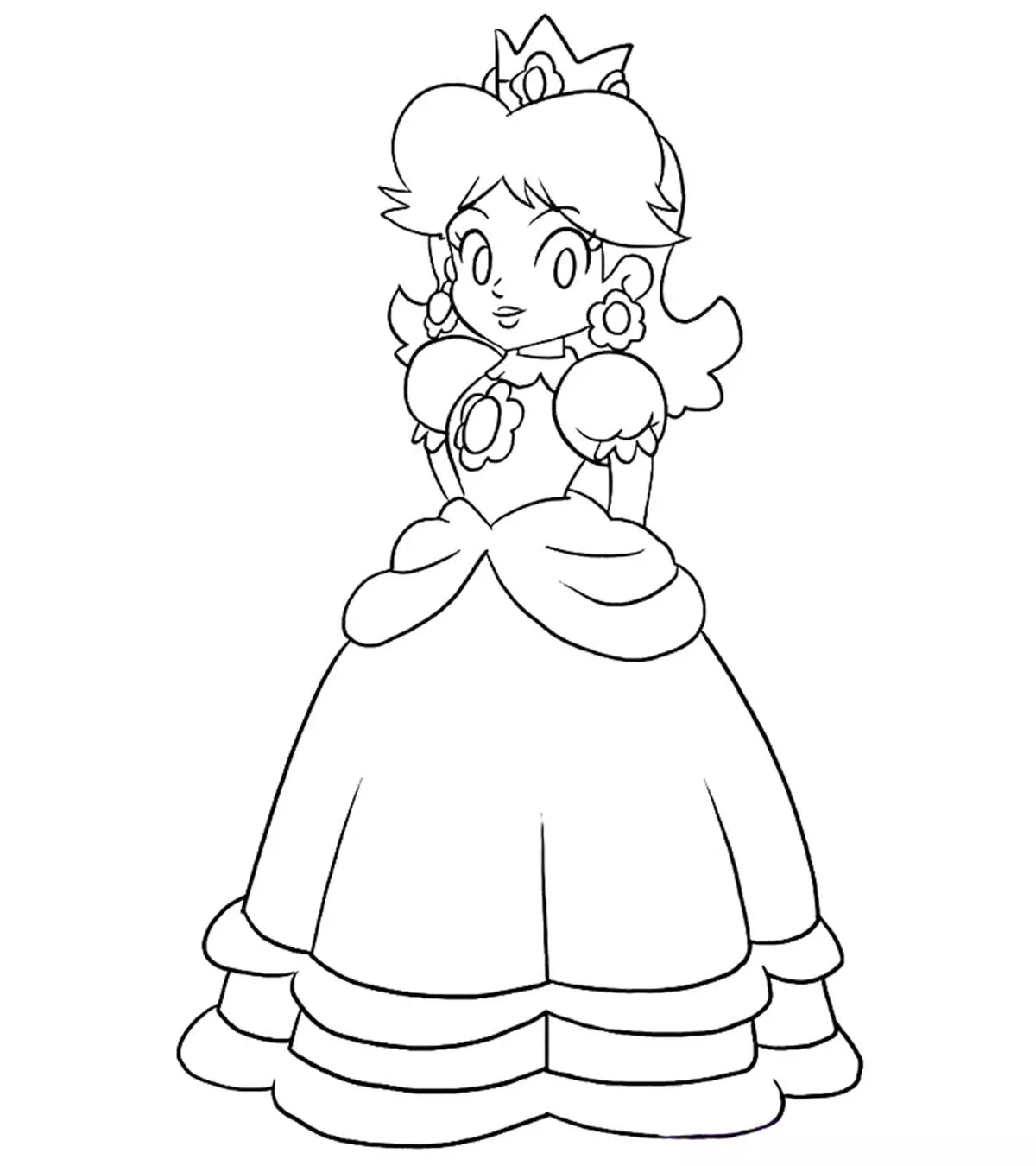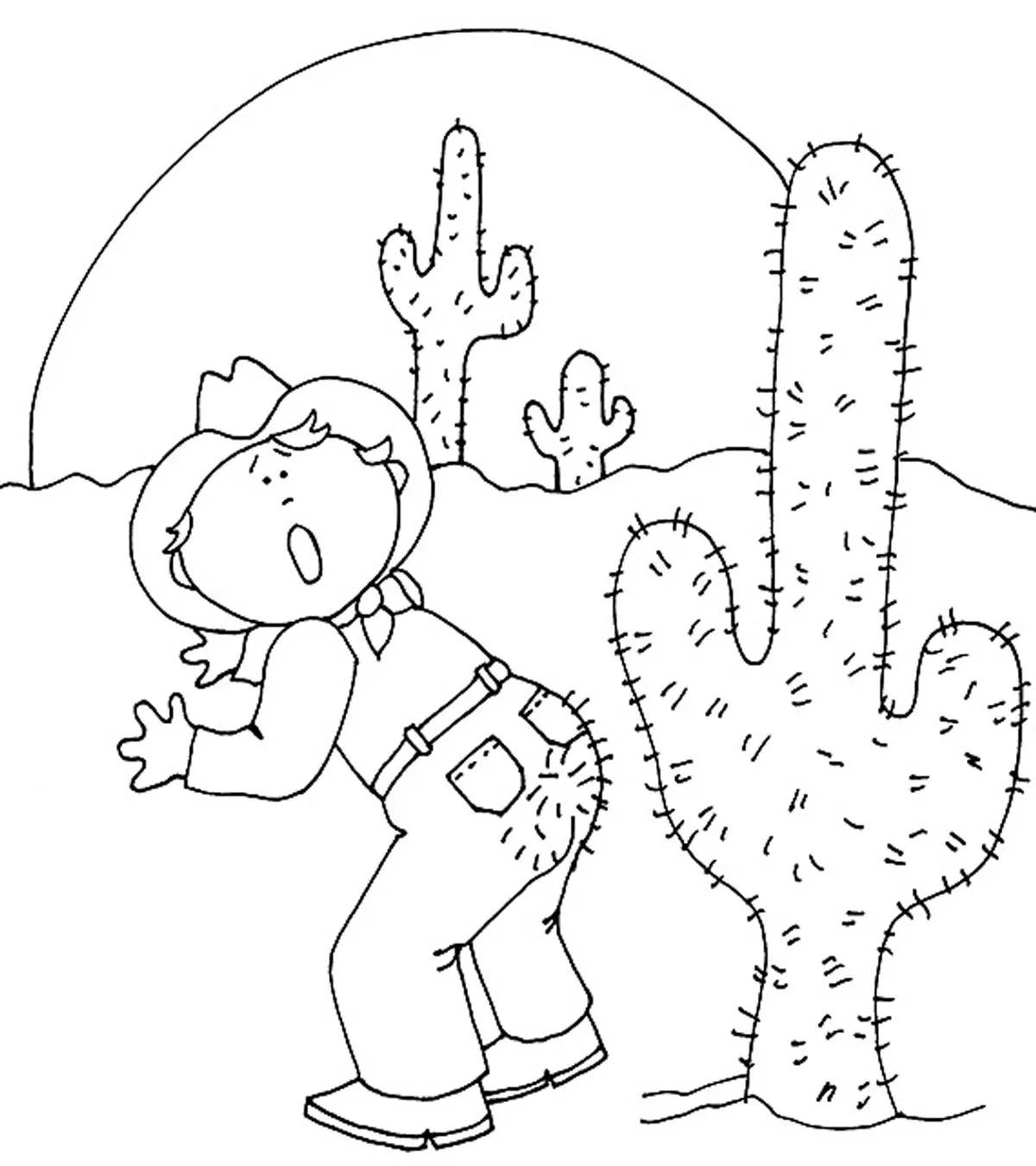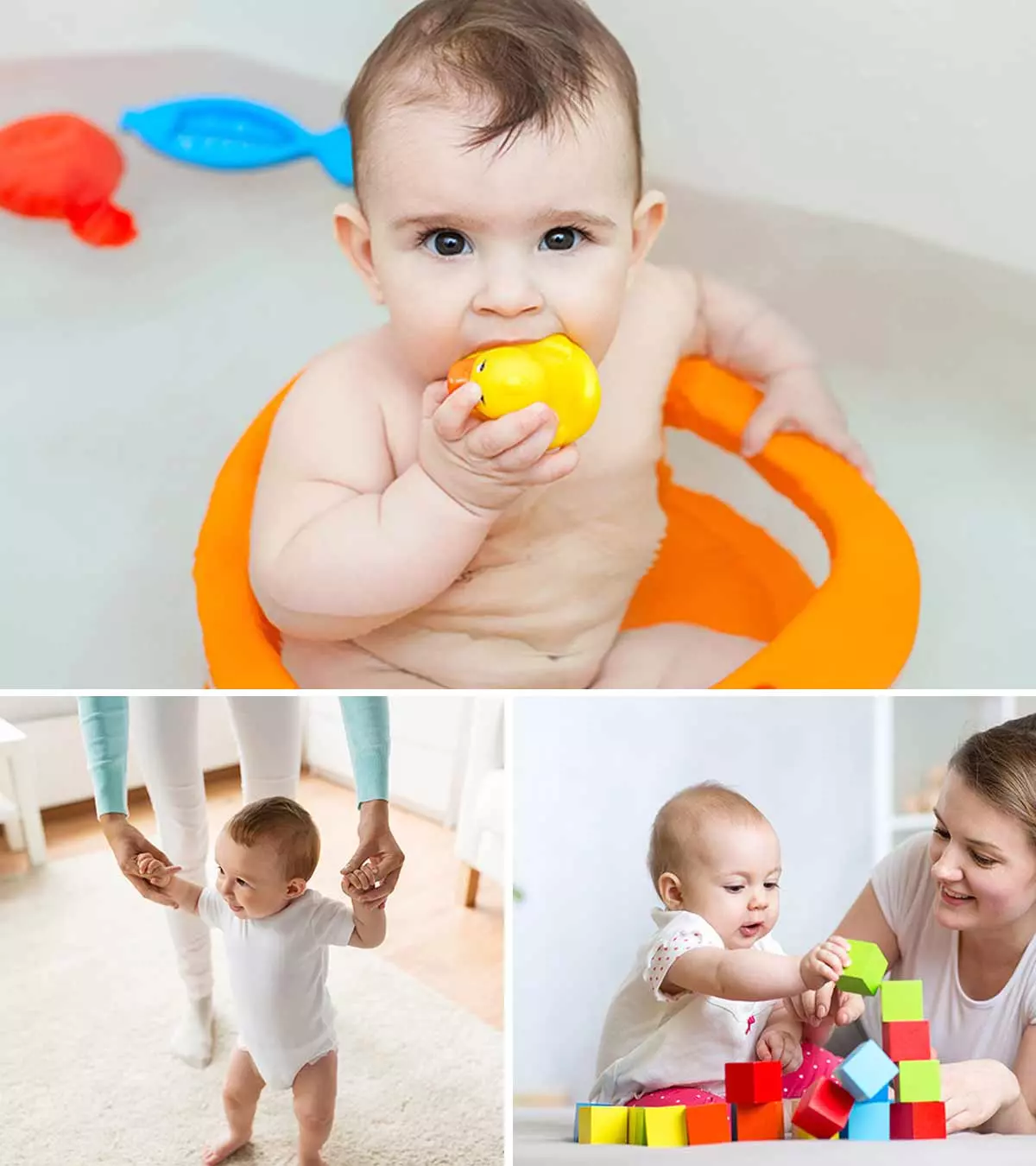
Image: ShutterStock
When your baby crosses a few months of age, all they try is exploration of the world. This is the time to introduce them to games and activities for 6-month-old babies. These activities can boost their cognitive skills and physical skills. At six months, babies rapidly develop key skills such as hand-eye coordination, social interaction, and sensory exploration. Engaging them in appropriate activities not only supports these developments but also strengthens the bond between parent and child.

Around this age, your little one also begins to eat pureed food for the first time, learns to respond to names, and recognizes their reflection during the mirror play. You can further help them develop these skills by sitting with them and engaging them in the various activities. To help you tackle this development pursuit, here are some of the best ways you can try. Read on to know more.
Key Pointers
- Games and activities can help improve your baby’s cognitive skills.
- Patience is key when introducing your baby to new activities.
- Massaging your baby and playing in the bathtub helps promote your baby’s physical well-being.
- Prioritize safety while engaging in these activities.
15+ Games And Activities For 6-Month-Old Babies
These activities will help in the baby’s physical, mental, and social development. Each activity nurtures a set of specific developmental skills, which we mention at the end.
1. Peek-a-boo with a blanket

You will need: A regular bed sheet or blanket
How to:
This is a classic game to entertain your 6-month-old baby.
- Make your little one sit facing you on the bed. Make sure that the baby has back support or a cushion to prevent falling.
- Hold a blanket and draw it over your head. When underneath, say some words to attract the baby’s attention like “Where is Mama?”, “Where am I?”.
- Once the baby is intrigued, slowly pull down the blanket and look straight into the baby’s eyes and say “peek-a-boo!.”
- Your baby may seem perplexed initially, but repeat the act a couple of times, and they begin chuckling. They soon understand the game and will tug the blanket themselves.
Skills developed:
Listening skills, vision-hearing coordination, general curiosity
2. Sit-n-splash the water
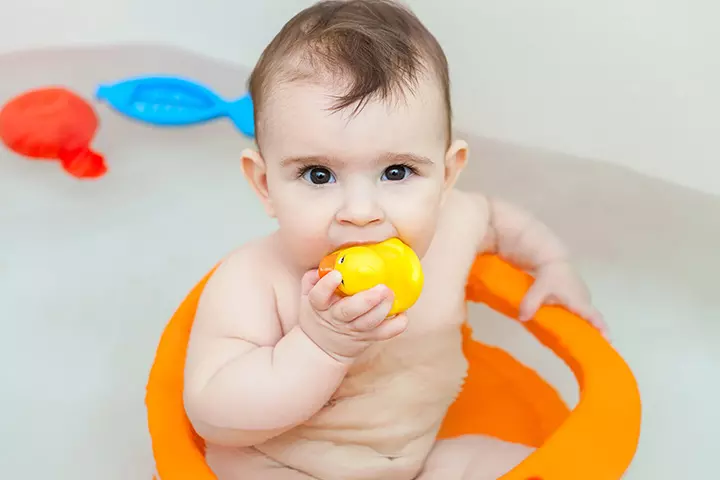
You will need: A bathtub
How to:
Babies can sit without support by the age of six months, and you can strengthen those back muscles with water play during bath time.
- Make the infant sit in the bathtub and place some toys around them.
- Guide their hand and get them to splash a toy in water.
- Continue doing so a few more times, and the baby repeats the act.
Babies innately enjoy playing with water, thus making this activity a great way to improve their lower back strength.Skills developed:
Muscle strength, general physical dexterityiThe ability to use the hands skilfully in doing something.
3. Nursery rhyme with dance:
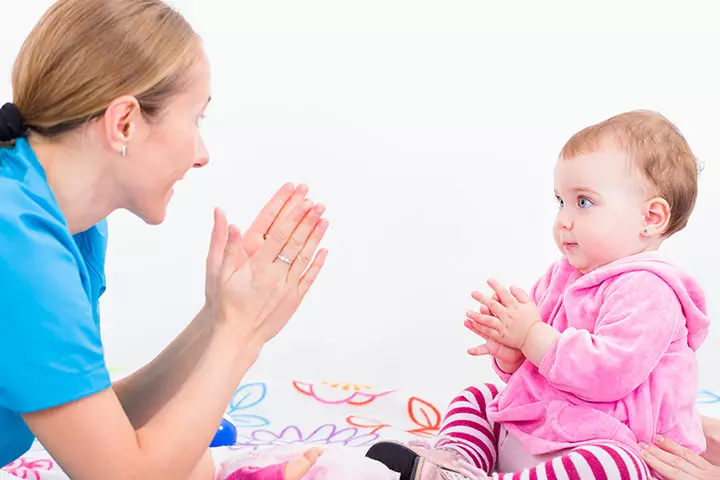
You will need: You and your baby
How to:
Playing with a six-month-old is all the more joyful when you add nursery rhymes or music and dance to the equation.
- Lie down on the bed with your head inclined while the baby sits in your lap facing you.
- Start singing a nursery rhyme (even a song will do) and rhythmically move your hands.
- Slowly grab the baby’s hands and move them to the rhyme while also making some funny sound effects like “Whoosh!” or “Swish.”
- Turn their torso gently as if they were dancing, matching those movements to a song.
Be prepared to see your baby giggle and chortle to your singing!
Skills developed: Basic voice and movement coordination, social skills
4. Fun with the bubbles
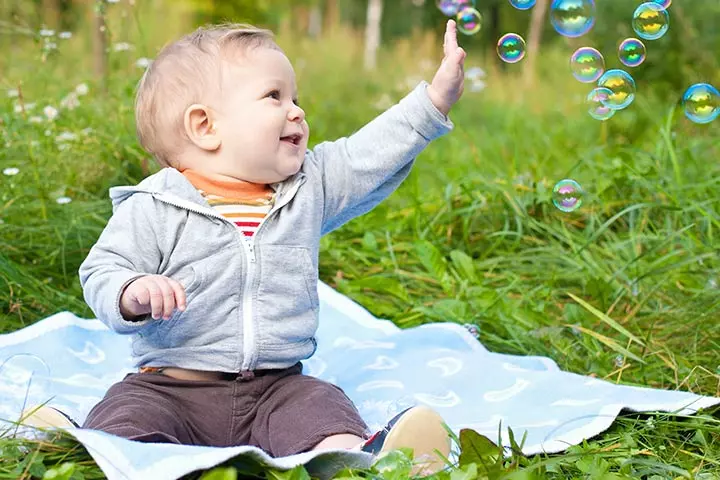
You will need: Bubble maker, your partner
How to:
This is a simple sensory development play for the baby’s eyesight.
- Ask your partner to blow bubbles with the bubble maker while the baby is watching.
- Sit beside your little one and prompt them to look at the floating bubbles.
- Try grabbing one, and the baby soon extends their hand to try it out.
- Blow one bubble within the baby’s line of sight so that they can track it till it floats away or bursts.
Skills developed:
Object trackingiAbility to estimate or predict the position of a target object. , vision development, muscle-sight coordination
 Be watchful
Be watchful5. Stacking the blocks
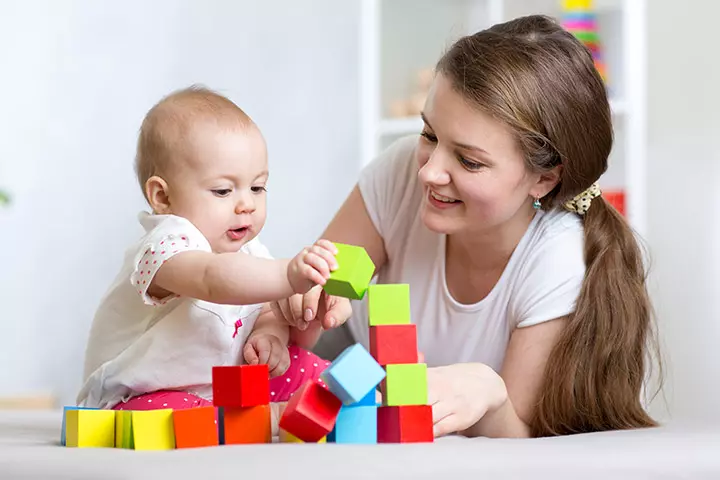
You will need: Colorful baby blocks
How to:
The ability to grasp objects develops around the age of six months and playing with colorful blocks is a nice way to exercise that.
- Make your baby sit while you stack some colorful playing blocks atop each other.
- Prompt them to hold a block themselves and guide their hand to stack a block.
- The baby may not get the stacking right, but the sight of enticing, colorful blocks will lure them to grasp one block after the other.
Skills developed:
Coordination of hand muscles, grasping ability, hand and eye coordination
Talking about their six-month-old daughter, Youtubers The Carnahan Fam say, ”We encourage her to grasp using three fingers three different objects. We guide her hand to make her grasp the object or we grasp that object first and give it to that part of her hand (i).”
6. Story reading

You will need: Brightly illustrated baby’s storybooks
How to:
Words may evade your six-month-old baby’s understanding, but they will love colorful illustrations on soft books. Story reading time helps reinforce their interest in colors and contrasting patterns.
- The baby sits on your lap while you open the book in front of them and start reading from the first page.
- Point at the images while you read the story, and label the pictures with their name like “That is a Lion” while pointing at a lion’s illustration.
- Sometimes babies make attempts to babble the words they hear. When they do so, respond to them with a question or a few words of praise.
Skills developed:
Basic understanding of patterns, visual perception skillsiThe ability to organize and interpret information that is seen and give it meaning. , listening skills
7. Who’s that?
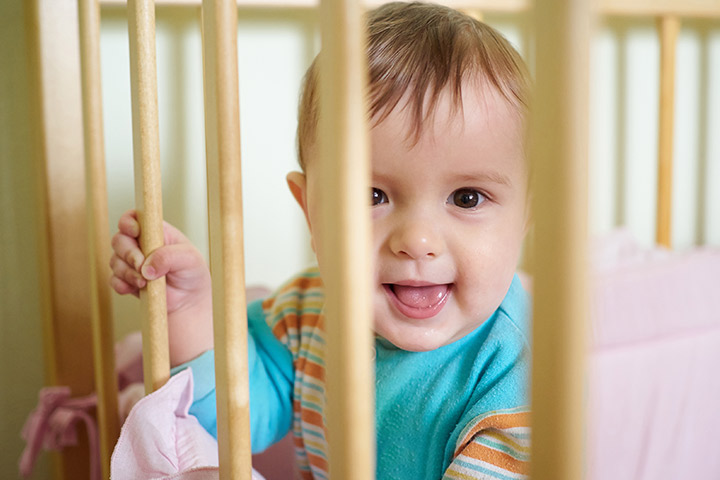
You will need: You and your partner
How to:
This is a stimulating activity for a six-month-old and can cement their name in their mind.
- Make the baby sit with you while your partner hides behind an object like a sofa or curtain and says the baby’s name.
- The baby recognizes the voice and the name and will look around curiously to determine the source of the sound. Encourage them and give clues by pointing in the direction of your partner.
This is an amazingly fun-filled activity that the entire family can play with the baby.
Skills developed: Auditory sense skills, identifying and locating sources of sound
8. The noisy box:
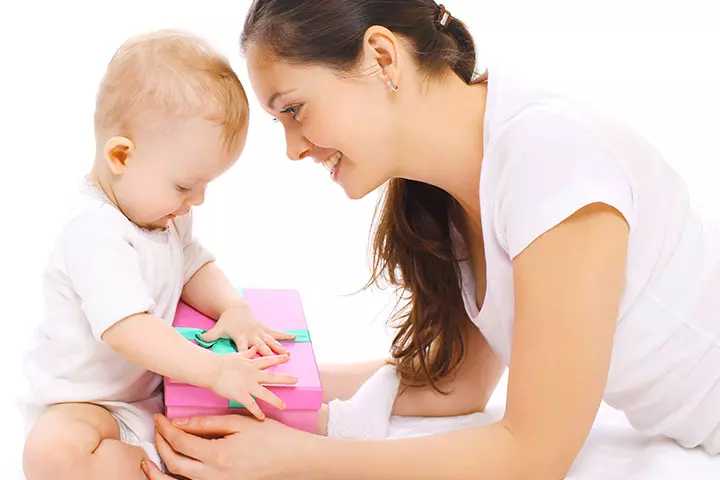
You will need: A plastic box filled with baby cereal
How to:
- Fill a small plastic container or box with baby cereal and shut the lid tight.
- Bring the box to the baby and shake it like a rattle.
- The sound emanating from the box attracts the baby, and they will try grabbing it, and when they do, hold their hands and shake the box gently.
Prefer using a box with a transparent plastic cover so that the baby can see inside and get excited.
Skills developed: Cause and effect, Understanding sound and motion relation
9. Bouncing on the legs:

You will need: You and your baby
How to:
It is time to bounce and exercise those baby legs!
- Hold the baby vertically, between their arms, on a soft surface like a mattress. Wait until they seem to settle their feet a bit firmly on the surface.
- The baby’s legs are far from holding body weight, so hold the infant while you gently spring them up and down.
- They will bounce when you do so, and that exercises their leg muscles.
Skills developed:
Muscle strength, improved range of motioniThe ability of the child to move their body parts. , basic balancing skill
10. Colorful purees:

You will need: Food purees of different colors
How to:
Your six-month-old can start consuming solid food now, so why not leverage it with a stimulating fun activity?
- Prepare purees of varying colors from different fruits and vegetables that you usually give the infant while on tummy time.
- Place them all in front of your baby on a plastic sheet (to prevent a mess!) with a large drawing paper on the top.
- Dip your baby’s hands in the puree bowl and make a hand impression on the paper. Repeat with the remaining purees to make handprints of different colors.
This is like a basic art and craft session for your baby, and since the colors are edible, you need not worry about them putting their hands in their mouth.
Skills developed: Visual stimulation through vivid colors, general tactile perception
11. Moving toy:
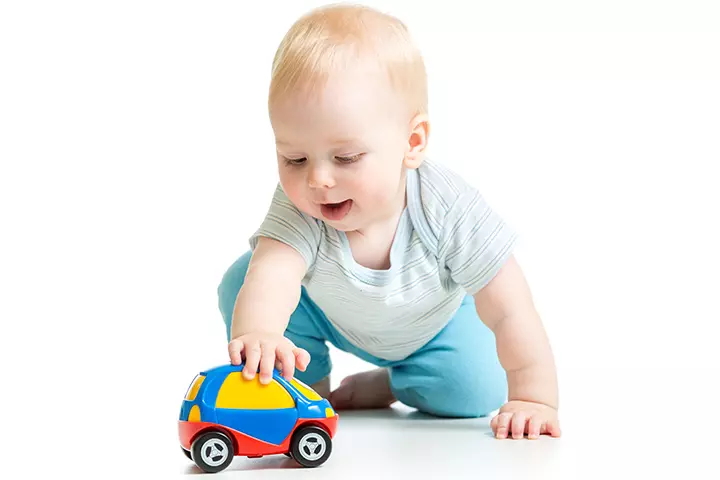
You will need: Stringed toy, your partner
How to:
Crawling using their tummy helps in the baby’s overall physical development.
- Place the baby on their tummy and place a stringed toy in their field of vision.
- Move it around a couple of times till your little one starts making attempts to grab the toy.
- Babies can roll over at the age of six months, so they will use this skill to get better access to the toy.
The moving toy helps in the development and also entertains the baby.
Skills developed: Vision-movement coordination, overall physical dexterity, and strength
12. Crunches for the baby:

You will need: You and your baby
How to:
Your baby’s neck muscles now support their head. Keep the development right on track with this crunches exercise for the baby.
- Sit on the bed with your legs stretched while the baby lies on them with their feet towards you.
- Hold the hands of the baby and gently pull their torso towards you at a full 90o.
- Say something funny or sing a song while you pull them into the sitting position.
- Hold them there for a few seconds before putting them on their back again.
This assisted baby movement will exercise their tummy muscles while enhancing the ability of their neck muscles to hold the head.
Skills developed: Muscle control, muscle movement nimbleness, overall gross motor skillsiThe ability to control and coordinate body movements such as walking and running.
13. Rolling beach ball:
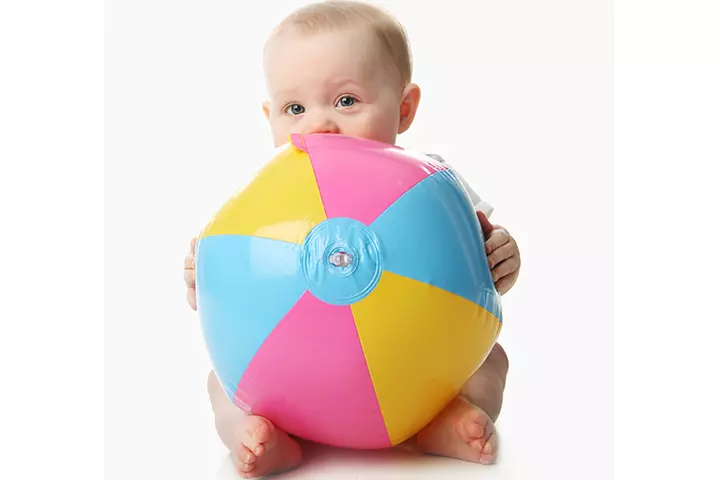
You will need: A beach ball
How to:
Play this activity anywhere – indoors or outdoors.
- Make the babysit at a distance and roll the beach ball between your hands till you have the little one’s attention.
- Slowly push the ball towards them while prompting them to catch it.
- Once they manage to lay their hand on the ball, they will try experimenting with the ball by moving it, hitting it or by simply lifting it.
In either case, they are flexing their muscles, making them stronger.
Skills developed: Object tracking, overall muscle strength
14. Tugging the string:

You will need: String made from soft fibers, yourself
How to:
This fantastic game exercises the six-month-old’s grip, which becomes more nimble around this age (4).
- Take a soft string made from wool or any other soft material, and place one end in the hand of the baby so that they hold it.
- Take the other end of the string and gently tug at it. The baby may initially let go, but you can prompt them to pull the string towards them, which they will eventually do.
This simple game helps to strengthen the baby’s grip and overall flexibility of their fingers. You may even use a mix of colorful intertwined strands that the baby should invariably find attractive.
Skills developed: Grip strength and resistance, muscle response to a force
15. Baby goes bicycling!

You will need: You and your baby
How to:
Often parents forget to exercise the legs of the baby, which constitute a large chunk of the body’s muscle weight. Here is an exercise to provide a necessary activity to the leg muscles.
- Place the baby on their back on a soft surface and gently lift both the legs.
- Bend them gently and move them in cyclic motion, as if the baby was pedaling a bicycle.
- Sing a song or a nursery rhyme to entertain the baby.
A simple and easy exercise for the legs and abdominal muscles.
Skills developed: Muscle strength, an improved range of muscle motion
16. Baby massage
You will need:
A towel or blanket, Oil or lotion
How to:
Body massage is an excellent way to bond with your baby and positively affects their physical health. Massaging your baby helps their physical well-being by promoting better sleep, reducing stress hormones, enhancing muscle flexibility, promoting healthy breathing, and improving digestion (1).
- To begin, undress your baby to their diaper and place them on a soft towel or blanket in a warm, quiet room when calm and alert.
- Proceed to gently stroke their legs, arms, and belly, working in sections based on their comfort level.
Skills developed:
Bonding, body awareness
These games for your six-month-old aim at the holistic development of the baby. But it is important to keep some points in mind while you play these games so that the infants reap the maximum benefit.
5 Tips For Parents Of 6-month-old Babies
Here is what you can do to ensure that your baby benefits the most from the above activities:
- Have interactive play sessions: Speaking to an infant during the activities can have a significant impact on their level of alertness. Talk to them frequently during play time to sustain their attention for longer. That way they will benefit better from the game.
- Involve your partner and other family members: The more babies play with people, the better are their chances of having superior social skills in the future. Involving your partner and other family members in the baby’s playtime encourages the baby to be more expressive and cheerful throughout the activity.
- Stay patient while the baby grasps the game: Just like adults, babies have personalities, so be patient when your baby is making efforts to understand the nature of the activity. Do not thrust it all at once or rush the activity. They may lose interest and may not show a keenness to play the game again.
- Maintain a schedule of activities: Do not limit your baby to a single activity. Instead, plan the activities for the entire week such that you don’t repeat something too often. Regular play helps reinforce the game, including the skills the baby would have learned through it. An infant is young and has a lot of free time at hand. Use it constructively with the above mentioned stimulating activities for a six-month-old.
- Baby-proof your house for safety: It is wise to observe your house from the height and angle your baby sees it. Look for danger from those positions and try to make it as safe as possible. Plaster a soft sponge to all pointy edges, keep sharp objects away from the baby’s reach and remove any stray wires on the floor. The home is an infant’s playground, and through the course of these activities, the baby may unintentionally bump into something that could cause injury. Having fun is essential, but the baby’s safety is paramount.
- Encourage sensory exploration: Introduce your baby to various textures and sounds. Use toys that crinkle, rattle, or have different textures to stimulate their senses. It will also help develop your child’s sensory, cognitive, and fine motor skills.
Frequently Asked Questions
1. How can I keep my six-month-old busy?
Toddlers enjoy silly fun games and activities such as play gyms, storytime, kicking or bouncing and attempting to move around, peek-a-boo, clapping, listening to rhymes, imitating parents or caregivers, and playing with bubbles. You can try these developmental activities and spend quality time with your little ones to keep them entertained.
2. What do six-month-old babies play with?
Babies begin imitating, grabbing, and identifying their environment at around six months. Introduce some entertaining push-pull, stacking, or toys with bead elements. Toddlers also enjoy playing with musical toys.
3. Can I exercise my six-month-old baby?
Exercise for babies is essential to their growth. Infant exercise can assist a baby in learning to walk, strengthen their neck, and improve their hand-eye coordination. Some simple exercises you may try include sit-ups, rolling on the mat, leaning, or moving arms up and down.
While doing activities is important for a six-month-old baby, rest and adequate nutrition are also necessary to keep the baby healthy and active. Also, remember that the activities you introduce to your baby are not exhausting. We hope you have fun watching your baby engage in these simple games and activities. Some of the activities on this list can also help keep track of your six-month-old’s growth and developmental milestones.
Infographic: Games And Activities For 6-Month-Olds
As your baby reaches six months, they become active and enthusiastic about their surroundings. So, you must ensure their daily routine includes plenty of games and activities to aid their growth and development. In the infographic below, we bring you activities suitable for your 6-month-old.
Some thing wrong with infographic shortcode. please verify shortcode syntax
Illustration: Games And Activities For 6-month-Old Baby
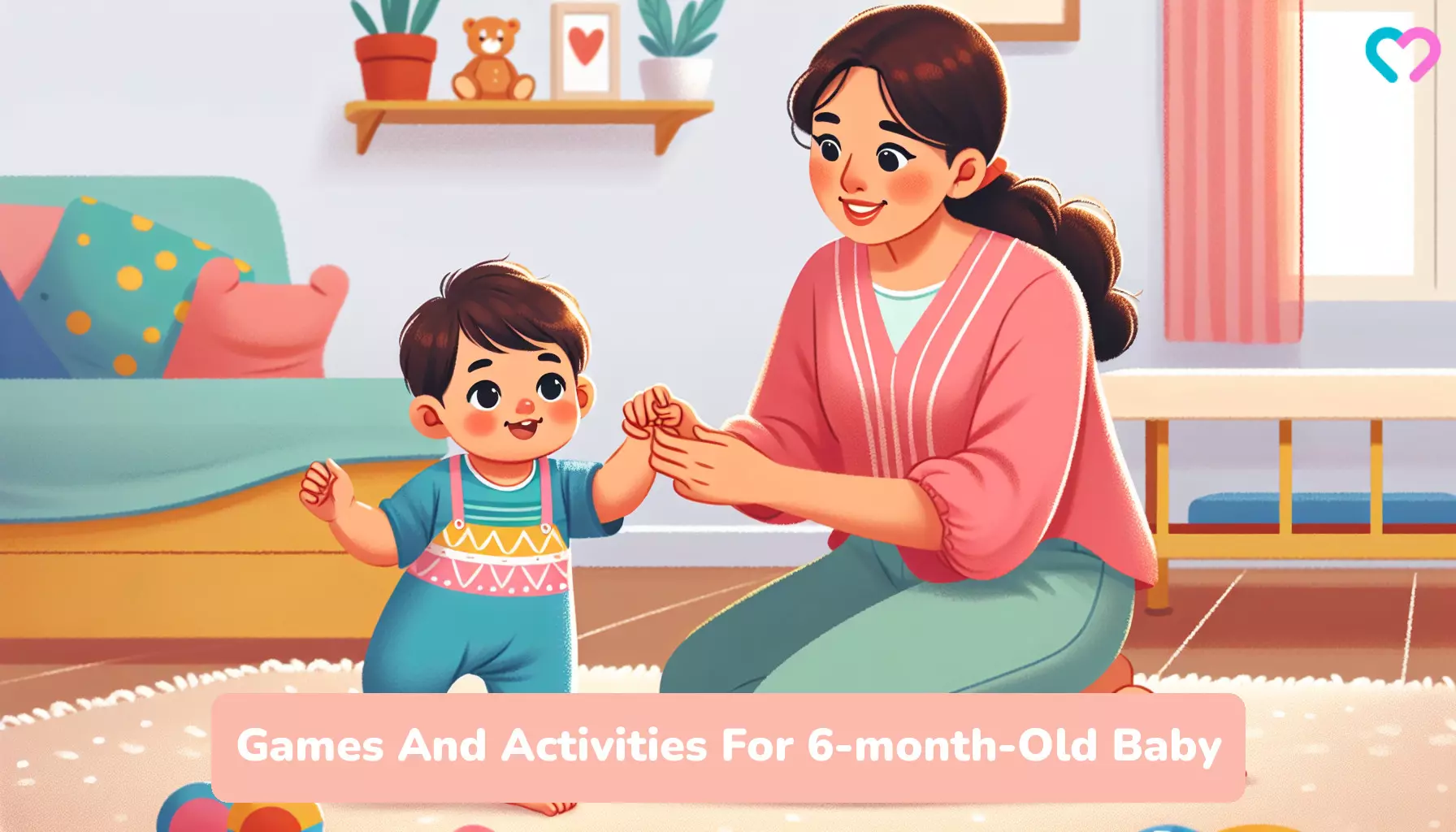
Image: Dall·E/MomJunction Design Team
Here are some exciting and interactive baby games to play with your 4 to 6-month-old to witness their rapid development! Make the most out of playtime with these engaging activities for your little one!
Personal Experience: Source
MomJunction articles include first-hand experiences to provide you with better insights through real-life narratives. Here are the sources of personal accounts referenced in this article.
i. 6 MONTH OLD MILESTONES & ACTIVITIES | HOW TO PLAY WITH YOUR 6 MONTH OLD BABY;https://www.youtube.com/watch?v=2fmpVbu_VGU
References
- The Benefits of Baby Massage
https://www.healthychildren.org/English/ages-stages/baby/Pages/the-benefits-of-baby-massage.aspx
Community Experiences
Join the conversation and become a part of our nurturing community! Share your stories, experiences, and insights to connect with fellow parents.
Read full bio of Dr. Elna Gibson
Read full bio of Rohit Garoo
Read full bio of Dr. Ritika Shah
Read full bio of Trisha Chakraborty





